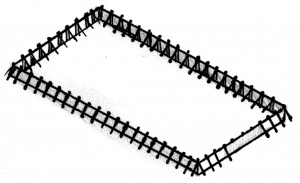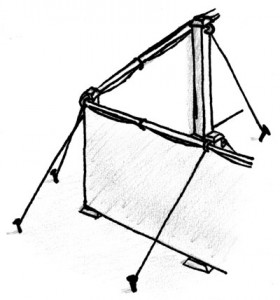“Aaron,” the Voice called the young boy in his sleep, “come with Me and I will show you the meaning of the Outer Court as I promised you. You can read about it in Exodus chapters 27 and 38 later on.”
Aaron’s heart leaped with joy. The Lord was here again and He wanted to talk to him, a little boy. Aaron knew the story of Samuel in the Bible how God had chosen him and spoke to him when he was still very young. But he didn’t know any other child at this time that God would speak to. Yet, he was learning that God doesn’t make any difference among people whether young or old. He comes and talks to everybody who wants to listen to Him. What a joy and peace Aaron was experiencing in the presence of the Almighty God!
 “Take this stick, Aaron,” the Voice commanded him. “It is one cubit long. Walk around the fence of the Outer Court and measure the length of it.”
“Take this stick, Aaron,” the Voice commanded him. “It is one cubit long. Walk around the fence of the Outer Court and measure the length of it.”
Aaron did as he was told to do. It took him quite a while but finally he came up with the right number: 100 cubits long and 50 cubits wide. He did his math real quick. “Well,” he thought, “it means that it is 300 cubits all around.”
“Good math, Aaron,” the Voice said to him. “Can you tell Me where else in the Scriptures you find the number 300?”
Aaron didn’t hesitate a bit. He knew it very well. It was Gideon’s army in Judges chapter 7! He liked that story very much and heard about it a lot from his father.
“Well answered, Aaron,” the Lord smiled with pleasure. “I want you to understand that today I still have My army like Gideon’s was. However, it is not only 300 men anymore, but this number 300 is a symbolic number representing the sons of God, those who allowed Me to change their human nature into My nature.”
While still in thought about God’s army, Aaron lifted up his head and noticed that in order for the cloth wall of the Tabernacle to be able to stand up, it was hanging on pillars made out of brass and anchored in the ground by brass pegs. He was also aware that there were sockets in the ground made out of brass.
By this time he knew that everything God makes in the natural has a spiritual meaning. Therefore, he was anxiously waiting for God to explain to him what this brass meant. He didn’t have to wait long; the explanation came quickly: “The brass means judgment, Aaron. If you read throughout the Scriptures and look up the word brass, you will see for yourself that it means just that. All men have equal opportunity to be either of God or of the devil. There is nothing in between. Everybody will be judged according to the decision they make.”
“But, Lord, what do the silver fillets on the top of the posts of brass mean? They are not judgment, are they?”
“You are right, Aaron, they are not judgment. Only brass talks of judgment. Silver speaks of redemption. Do you know what redemption means?”
“I am not sure, Lord,” was Aaron’s hesitant answer.
“Redemption means that you are bought from the kingdom of darkness into the Kingdom of light; you don’t have to behave like a slave anymore, but you have become the child of the living God. You see, redemption surrounds the whole court. The Outer Court only represents judgment and justice against your enemy, sin. The purpose of this judgment is redemption. Though you are shut in forever, it is to redeem you from your enemy. If you look carefully, you will see that the hooks are also made of silver, and these are used to hold the hangings.”
 Now, after being given so much information, Aaron still wanted to know what the hangings meant and what they were made of. He learned that they represent the flesh and their hooks are made of silver. It means that even though we are made of flesh, we are kept in the right place by the redemptive power of God. The hangings are made of fine twined linen, which is made by hand. Linen symbolically means purity and purity is a defense of the people of God. When the devil comes and you are pure, he cannot stay around but has to run away. The handiwork means that there are people ordained by God, the ministry of God, who work busily to perfect God’s work within men.
Now, after being given so much information, Aaron still wanted to know what the hangings meant and what they were made of. He learned that they represent the flesh and their hooks are made of silver. It means that even though we are made of flesh, we are kept in the right place by the redemptive power of God. The hangings are made of fine twined linen, which is made by hand. Linen symbolically means purity and purity is a defense of the people of God. When the devil comes and you are pure, he cannot stay around but has to run away. The handiwork means that there are people ordained by God, the ministry of God, who work busily to perfect God’s work within men.
There was one last thing Aaron was curious to know about and it was the gate. He noticed there was only one gate leading inside the Court and it had four pillars. As he was trying to peek in, the Lord spoke to him.
“Aaron,” He said, “this is the gate by which men can come back to God. Do you remember how I had to cast Adam out of the Garden of Eden, out of My presence, out of a close relationship with Me, because he sinned? With Adam’s fall I have provided a way for all people to come back to Me if they want. This gate with its four pillars shows them how: four speaks of testing and tribulation and change. Tribulation is the only means by which I am going to purge sin out of My people once and for all. Isn’t it exciting to know that there is a way out of sin?”
“It sure is exciting,” Aaron admitted in his thoughts. He often wondered how people, who are so bad, could come to a pure and righteous God and not die. Now, he knew: God has provided a way! “Lord, will You show me how to walk in Your way so that I might be in Your presence forever?” Aaron wanted to know.
As he asked, it was as if he felt the strong but gentle Voice smile, “This is why I came to you, Aaron. So that you would know My way for yourself and also, so that you could teach it to others. I will come to you again, very soon…” These were the last words Aaron heard. There sure was a lot he would have to think about…
Answer the following questions to see how well you understood this chapter:
- How long is the Outer Court? Can you remember what that number means?
- What does brass represent? Can you tell which things in the Outer Court are made of brass?
- What does silver represent? Can you tell which things in the Outer Court are made of silver?
- What are the hangings made out of? Does it have a specific meaning?
- How many pillars does the gate consist of? What does the number mean?